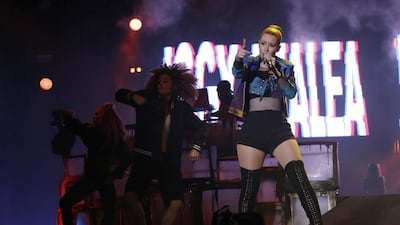Sometimes it's best to lay low. That was the decision rapper Iggy Azalea made about a year ago after spending six months bogged down by bitter online feuds with other rappers.
The controversy kicked off in December 2014 when ever-volatile performer Azealia Banks attacked Azalea online for not caring about the present plight of African-Americans.
Azalea says her dismissal of Banks’ tweet was misconstrued as a rebuff against the entire Black Lives Matter movement.
The incident was the trigger for a wider online discussion about the legitimacy of Azalea’s success.
The 25-year-old Australian artist grew up in relatively rural surroundings and arrived in America as a 16-year-old determined to make it as a rapper.
After a series of promising underground releases, she hooked up with southern-rap king T.I. and released her chart-topping debut album, The New Classic, in 2014.
What seems especially galling to her critics – including socially conscious rapper Lupe Fiasco and bonafide hip-hop legend Q-Tip – is the fact that Azalea, who raps in a pitch-perfect southern twang and uses the bass heavy productions pioneered by southern hip-hop artists, has never fully acknowledged the debt she owes to hip-hop culture.
Azalea seemingly mistook their arguments as personal attacks and hit back, going as far as labelling Q-Tip’s heart-felt twitter hip-hop history lesson in December 2014 as “patronising”.
After her mentor T.I. cut ties with her and a 2015 North American tour was cancelled, reportedly due to low ticket sales, Azalea called for a time out.
She emerged two weeks ago with her first run of shows in six months, part of which found her headlining the Mawazine Festival in Morocco.
Understandably, Azalea discusses the events with some trepidation. She refers to the online spats as “a soap opera” and her absence as a mini-death of sorts.
“Sometimes you almost have to kill your character so you can come out with your message and not have it twisted into whatever that story line is that was ongoing last year,” she says at the festival, in Rabat.
“I just felt like it got a life of its own and that there was not a lot of truth to it. So I was very cautious. I didn’t want to put out any music or an album and have it twisted. It was important for me to take time out.”
Those months away were not spent idle. Azalea was working on her second album, Digital Distortion, which is due for release late next month.
We got a first taste of it in March with the release of lead single Team. The club-tastic track, which has had more than 40million YouTube views, has her returning to the electro-dance territory that made her 2014 Rita Ora collaboration, Black Widow, such an international hit.
Delve beyond the cutting edge sounds, however, and you find Azalea at her most bullish. Team is an ode to self-sufficiency: she raps the three verses in addition to singing the hook.
Lyrically, she seems to accept the fact she is alone in hip-hop’s wilderness: “Baby, I got me and that’s all I need” she chants in the chorus.
For her, the track best represents the overriding theme of Digital Distortion. She confirms the album title is directly linked to her online dramas.
“There is a lot of looking for validation because of things like social media and wanting other people to like you, to worry about how many social-media followers you have or who likes your post and how that dictates what you do,” she says.
"That's not the best environment to foster creativity. So for me it was important to have a song like Team – it opposes that message that we are told subconsciously every day."
Over the past 12 months, Azalea quit Twitter several times, only to reactivate her account.
She says that the full power of social media is still something artists, and the music industry in general, are grappling with.
“It is different and tricky – especially as an artist,” she says. “I think artists should be controversial and push the limit of what they say and not have censorship.
“But when it comes to appropriateness of what is in the song and what to say in social media, I think there is a line. We still have to figure out what that is – what should stay on the record and what should be said on social media.”
Until those barriers are defined, Azalea is forging ahead: Digital Distortion is expected to be a big-seller and a major international tour is in the works.
Azalea suspects, however, her success will only be celebrated by her tight inner circle.
Convincing her fans is one thing, but being accepted by the wider hip-hop community remains a tougher task.
”I guess that they are technically my peers,” she says. “But I don’t know if they want me to be all the time. Sometimes it feels that some people want to keep me on the outside forever.
“But when I am with my friends and I am sitting there creating, I do feel like an insider.”
• For the latest updates from the Mawazine Festival, visit www.thenational.ae/blogs/scene-heard
sasaeed@thenational.ae


